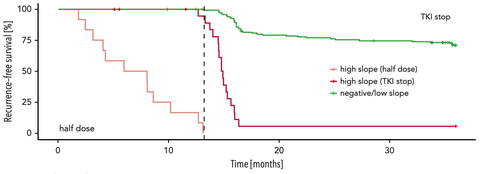Predicting the risk of relapse after discontinuation of therapy for chronic myeloid leukaemia (CML)
General background: The use of thyrosine kinase inhibitors (TKIs) is a very effective therapy for the treatment of chronic myeloid leukaemia (CML). Although TKI therapy can control the disease for the majority of patients and the probability of survival is almost the same as that observed in an age-matched population of healthy people, it has not yet been shown that treatment with TKIs actually leads to a cure. Lifelong TKI treatment is still the default.
Specific motivation: However, a number of studies show that discontinuation of TKIs in the case of a previous (very) good and sustained response leads to a permanent remission in around 50% of patients. It is not yet possible to reliably predict for which patient the discontinuation of the TKI will be successful.
Results: In our project, we use statistical models (including logistic regression) to investigate whether and how a prediction of the probability of relapse after TKI is possible. Our results show that the dynamics of the response in the context of TKI dose changes are particularly informative and that the response in the context of a dose reduction before discontinuation of the TKI allows patients with a high risk of relapse to be identified.
This project started as part of the prediCt-consortium (2018-2021) and is now beeing continued.
Involved scientists
- Dipl. Biomath. Andrea Gottschalk
- Prof Dr Ingmar Glauche
- Prof Dr Ingo Roeder
Publications
A. Gottschalk, I. Glauche, S. Cicconi, R. E. Clark, I. Roeder Molecular monitoring during dose reduction predicts recurrence after TKI cessation in CML Blood 2020
Funding
EU/ERACoSysMed, BMBF (finished)
IMB budget

